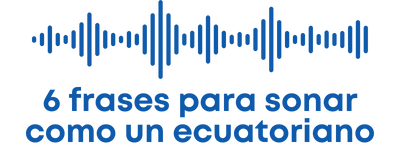For examples and more explanations, listen to the episode.
Some years ago, when I started learning English, I went to a bar where the owner hosted a language exchange.
I had been studying with Duolingo for about three months, and I thought: “Ok, I’m probably ready to have a simple conversation.”
Spoiler: I wasn’t.
That night I met a girl from Australia and a guy from Laos. I was excited because I was finally meeting people from other parts of the world.
I was kind of nervous but confident at the same time, because remember, I had already been studying English for three months.
They started the conversation.
— What’s your name?
That was easy.
— My name is Andrés.
Good start, right?
The next question was ‘where are you from?’, but I didn’t understand it.
I had to ask an Ecuadorian guy who was sitting next to me to translate the question.
It means “¿de dónde eres?,” he told me.
And I answered:
— Ahhhhh, I’m from Quito (the capital city of Ecuador).
That was a little embarrassing. I mean, not being able to understand that simple question.
Then, the next one: ‘How old are you?’
This time, I understood the question. ‘How old are you‘ in Spanish is “¿cuántos años tienes?”.
But guess what. I was nervous and I forgot numbers, so I didn’t know how to say I was 25. Again, the Ecuadorian guy helped me. I’m just thankful that he was there.
To be honest, at that point in the evening, I was kind of disappointed. I thought I was ready for at least a short conversation, and I wasn’t.
It was a good experience though. You see, locals and foreigners encouraged me to keep trying, and I did; and it felt good to know that nobody was judging me.
I went to the same bar again the next week, and this time I was ready. Not ready for a whole conversation, of course, but at least I could introduce myself and ask other people about their name, age and nationality.
After that I just waited until we switched to Spanish and then I realized their Spanish was just as basic as my English, and just like me, they wanted practice.
Language learning is a long journey, and we all have to start from the beginning, right?
But since I don’t want you to go through the same experience I did, I want to show you how to introduce yourself if you are a complete beginner.
Actually, it’s really easy:
If you want to tell someone your name, you have three options:
- Mi nombre es Andrés (my name is Andrés)
- Me llamo Andrés (it’s like “I call myself Andrés”, and it’s really common)
- Soy Andrés (I’m Andrés)
If I were you, I would go for “me llamo Andrés” or “Soy Andrés”. [With your name, of course.] The other one (mi nombre es) is correct, but it would sound like you are reading a textbook. Some people still say that though.
If you want to say how old you are
You can say: “tengo 32 años”. It literally means ‘I have 32 years’, and I get it, to you it must sound weird to use the verb ‘have’ to talk about your age, but that’s how Spanish works. We have years.
And, how do you explain where you live now and where you’re from?
I would say “soy de Ecuador” (I am from Ecuador) and “Vivo en Sangolqui” (I live in Sangolqui (the name of my city)).
And if somebody asks ‘what do you do for a living?’
I would say “soy profesor de español” (I’m a Spanish teacher), and since I’m guessing you are not a Spanish teacher, here are some other options:
- soy doctor (I‘m a doctor)
- soy abogado (I’m a lawyer)
- soy veterinario (I’m a veterinarian)
- soy programador (I’m a programmer)
You know? If I wasn’t a teacher, I wish I could be a programmer. I mean, I like being a teacher, but it must be interesting to be able to create something by writing code.
Anyway.
For a simple self introduction, those are the phrases you should know.
But if you also want to ask for the other person’s information, use these questions.
- ¿Cómo te llamas? (What’s your name?
- (I would answer: Me llamo Andrés)
- ¿Cuántos años tienes? (How old are you?)
- (I would answer: Tengo 32 años)
- ¿De dónde eres? (Where are you from?)
- (I would answer: Soy de Ecuador)
- ¿Dónde vives? (Where do you live?)
- (I would answer: Vivo en Sangolquí)
- ¿A qué te dedicas? (What do you do for a living?)
- (I would answer: Soy profesor de español)
And that’s it. Now you know how to greet and meet people in Spanish.
Of course, you need to learn more than that to have a real conversation with a native speaker, but this is a good start. Just remember to practice.
Go and say hi to other people.
